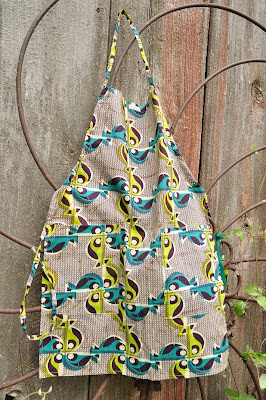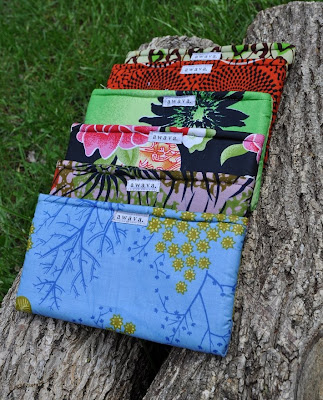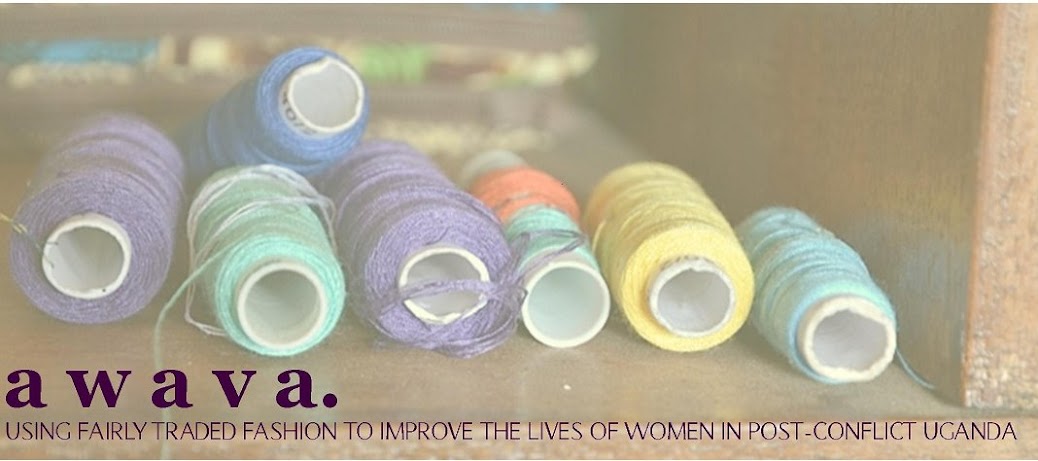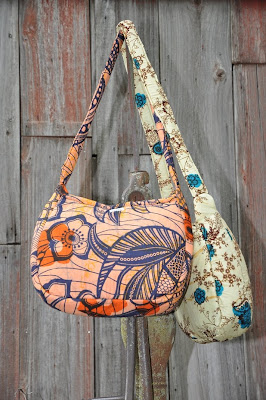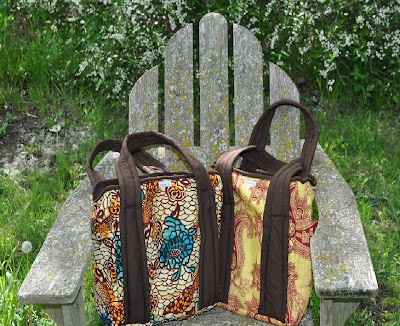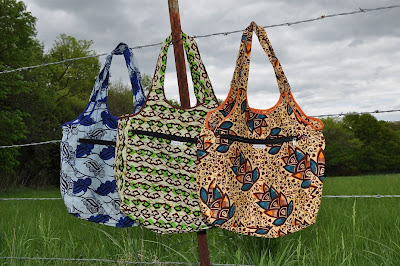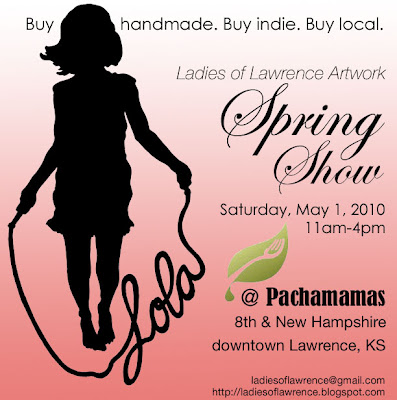by: Elise Higgins
Upon initial examination, Awava seems to be relatively similar to any other fair trade project in an African nation. It is coordinated by an earnest white woman with marketing savvy, the products are sold to college-educated Americans, and stories of hardships overcome by artisans are used to compel buyers and sellers alike. When one looks more closely at Awava, however, one sees a nuanced understanding of Ugandan economic and political systems, an innovative approach to fair trade, and an incredibly successful tool for building power in post-conflict communities. Awava embodies several components of feminist theory: the linkage between theory and activism, a woman-focused approach to war and peace, international feminist solidarity and a feminist lens on women and the development process.
Feminism and Activism
Awava clearly demonstrates that feminist theory is not trapped in an ivory tower, only to be accessed by academic elites. Rather, it frames action, allowing activists to envision a more socially just world and then pursue that vision. Judith Butler understands feminist theory and praxis as a kind of symbiotic relationship, stating,“Feminist theory is never fully distinct form feminism as a social movement. Feminist theory would have no content were there no movement, and the movement […] has always been involved in the act of theory. Theory […] takes place every time a possibility is imagined,” (Butler 176). While Kate Von Achen, Awava founding director and former KU student, does not articulate Butler’s vision specifically, the passion with which she explains Awava’s positive impact and her desire to create empowerment clearly demonstrate that feminist theorizing is at work. In general terms, feminist theorizing has allowed her to envision a world wherein women are economically empowered and can build sustainable communities. In specific terms, this philosophy and action plan can be evaluated in terms of war and peace, international feminist solidarity and the role of women in development.
War and Peace
It is no secret that women, though less likely than men to be combatants, are nevertheless acutely affected by war. As one author explains, “Women bear specific burdens in crisis zones. Their responsibility for sustaining families is increased, but the resources available to meet those needs are diminished,” (Seager 98). Women in Uganda are not currently experiencing open warfare, but the effects of conflict are ever-present. Where Ugandan women live, their access to resources and education, and the state of their families are only a few markers of war in their daily lives. Jill Steans elaborates that,“While most commentaries view war as a discrete phenomenon arranged by diplomats with neat beginnings and endings […] feminists have recounted women’s testimonies and post-war stories and thus highlight the “unboundedness” of war,” (Steans 58). This “unboundedness” has a direct impact upon expectations for women’s time and attention; women are often expected to fulfill the role of “carer,” but during conflict, “Women are often left with sole responsibility for the welfare of the elderly and disabled relatives as well as children,” (Steans 58). Awava recognizes this reality and directly addresses it. Kate Von Achen explains that women are chosen to produce Awava goods because they are more likely to build sustainable social growth and put money into their family, education and food. Especially in the Gulu region, where nearly all lives have been marred by civil war, Awava’s direct investment in building up social stability through women is crirical. Awava also focuses on women displaced by conflict and living in transitional housing or refugee camps. Women are uniquely hurt by housing insecurity in times of conflict; Steans states that, “Women and children constitute on average 70-90 percent of refugee populations, although the smaller percentage of male refugees frequently gets disproportionate access to food, clothes, land, jobs and legal identity papers, water, livestock and tools,” (Steans 58). Kate and her allies actively seek out women displaced by conflict to craft Awava goods, that the resources generated in the project will create a greater net change in those women’s lives.
Additionally, Awava focuses on women in areas experiencing ecological damage due to war. One of those areas is the Karamoja District in Northeastern Uganda. According to Awava’s website, “Lotome sub-county is one of the driest lowlands and more vulnerable to conflict that any other section of Karamoja making alternative income generating activities (IGAs) even more crucial,” (Awava website). Awava’s recognition of the myriad ways in which conflict affects justice, in social and ecological senses, fits it within a feminist framework of war and peace. Awava does not explicitly embrace essentialist feminist viewpoint that women are inherently peaceful or peacemakers, but its founders do understand that the connection between women and war is often different than the connection between men and war. Ultimately, they share Steans’ conception of feminist peace, as she explains, “Because feminists, generally, start from the conditions of women’s lives, […] they define peace in terms of people gaining control over their lives,” (Steans 60). Control over one’s life, they believe, does not merely happen in one area of life or another but in all aspects of existence. This view that every decision and hardship, whether it relates to economic well-being or healthy relationships, is politically charged, hearkens to the radical feminist perspective that “The personal is political.” Departure from conflict in the lives of Ugandan women, then, means not simply a signed peace accord but “a total approach to living,” (Steans 60).
International Feminist Solidarity
Awava does an excellent job of building international feminist solidarity. The fact that Awava’s goods are intended to be consumed by a most White, Western audience is secondary to the purposeful allocation of Awava’s earnings and employment opportunities. Awava operates with an excellent understanding of Ugandan cultural particularities, including language politics and areas of particularly brutal warfare. This respect for local context is key to solidarity building, according to Mohanty, who states, “[…] cross-cultural feminist work must be attentive to the micropolitics of context, subjectivity, and struggle, as well as to the macropolitics of global economic and political systems and processes,” (Mohanty 223). White feminist consumption of Awava’s goods also gives Western feminists an opportunity to participate in an intentional act of solidarity the women of Uganda. Both Ugandan women and Western women have important roles to plan in transnational feminist solidarity. These Without socially conscious, relatively affluent consumers, Awava could not possibly exit. Awava’s macropolitical knowledge is present in its adoption and refinement of an internationally recognized fair trade system and its awareness of the importance of economic empowerment for women in all conflict zones. Mohanty reminds us what Awava already knows; that is that local struggles and circumstances are often microcosms of global issues. According to Mohanty, “In knowing differences and particularities, we can better see the connections and commonalities because no border or boundary is ever complete or rigidly determining,” (Mohanty 226). Avoiding re-colonizing and cultural relativism is crucially important in building true feminist solidarity, and Awava’s focus on empowerment rather than dependence and local context rather than comparisons with the West make its efforts genuine and sustainable, (Mohanty 229). Awava specifically avoids re-colonization in several ways. It does not seek to make Ugandan women dependent upon Western resources; its raise system and investment in small business loans for artisans seeks to promote independence. Additionally, Awava does not seek to create Ugandan workplaces in a Western image; the workplaces incorporate uniquely Ugandan characteristics by being in homes and shared between family members. Kate hopes to eventually open a centralized workplace in order to build solidarity and sharing among artisans, qualities not found in most Western workplaces.
There is one area wherein Awava does not meet Mohanty’s and others’ expectations for a movement of feminist solidarity; they reject neither capitalism nor all forms of globalization. The buying and selling of goods is integral to Awava’s success, but this reality does not necessarily mean that Awava endorses unfettered capitalism or globalization. Awava’s fair trade practices modify capitalism significantly, and are designed with twin motives of profit and sustainable social growth. In this instance, it seems that utilizing the master’s tools of capitalism and global exchange may dismantle the master’s house and build feminist solidarity.
Women and Development
Awava’s connection to feminist theorizing is most clearly visible in its treatment of women and development. Their website specifies that their mission is “not one of charity, but of economic empowerment […] In assisting Awava’s artisans with design and providing Western market access, we at Awava are not only providing a space in which marginalized Women in Uganda can sell their masterpieces, but ensuring that these products will sell, “(Awava website). This specific utilization of capitalism has its basis in a feminist understanding of the importance of economic resources in building women’s power. In his analysis of women “climbing the power pyramid,” Rae Blumberg specifies that,“(1) the three constraints on women’s political participation are lack of income, lack of information, and danger of male violence; and (2) the two factors galvanizing women’s political activism are economic resources as well as training and information that are directly relevant to their lives,” (Blumberg 100). Awava seeks to help women generate their own income, that they can better access information in the form of education and become full participants in Ugandan civil life. Increasing material prosperity has direct political consequences; according to Blumberg, “as their economic power rises, women gain in self-confidence and in “voice and vote” in household-level decisions concerning fertility, economic allocation patterns, and domestic well-being,” (Blumberg 98). Kate Von Achen specified that women were chosen as participants in Awava for many reasons, among them the understanding that Ugandan women often faced opposition or some form of abuse from the men in their lives. Kate cited many reasons that men were likely to prevent women’s “voice and vote” from being heard, among them the reality that men were likely to spend their income on alcohol, a choice, she said, that likely resulted from a feeling of post-conflict emasculation or stress disorder. Women, on the other hand, are more likely to make spending choices which improve community sustainability; according to Steans, “when women have direct control over income, they tend to spend it on the well-being of the family, particularly on improving the nutritional security of the more vulnerable members,” (Steans 75).
This generalization may appear at face value to violate Mohanty’s dicta of focus on particularities, but observation and participation by Awava staff prove this observation about gendered differences in spending proves to be true in Uganda. In terms of categorical feminist perspectives on women, gender and development, Awava most closely fits into a Gender And Development model. Awava’s website stresses that their mission is empowerment, not charity, aligning the project philosophically with GAD’s tendency to see women as “agents of change, rather than passive recipients of development assistance,” (Dhar and Kapur 1990). Awava also seeks to upset existing power relations in Ugandan society between men and women, encouraging women to have ownership in public and private decision making. Like Gender and Development theorists, Awava also welcomes the contributions of “sensitive men;” Kate shared that Awava’s most technically skilled artisan is a man physically impaired by war injuries and living as a displaced person. Awava’s holistic focus on women’s lives and ending abusive power relations makes it effective, non-colonial and an excellent example of feminist theory on development impacting practical change, (Dhar and Kapur 1990).
Judith Butler’s observation regarding the inextricable nature of feminist theory and praxis is proven true by Awava’s embodiment and incorporation of feminist theories of war and peace, solidarity and development. Awava envisions a world wherein women are powerful social actors with self-sustaining modes of economic enhancement. The project itself seeks to no longer be necessary in a more peaceful and just Uganda. Meanwhile, Kate Von Achen and her staff continue a focus on cultural particularities, such as focused employment in the war-torn Gulu region, as well as global realities, such as women’s tendency to make wise spending decisions. Awava will continue to be an extraordinarily positive force, both in theory and praxis, for Ugandan people. Meanwhile, Western feminists have an opportunity to expand their understanding of what feminist solidarity can mean. Awava seeks to transform the act of consuming an African fair trade good from a token practice without personal meaning into an involve process wherein the consumer is aware of how they are helping the producer. Every product is accompanied by a green Awava postcard detailing the ways in which Awava seeks to build sustainable growth in Uganda by moving beyond fair trade into a truly feminist form of work and production.
Works Cited
Blumberg, Rae Lesser. “Climbing the Pyramids of Power.” Gender Inequality: Feminist Theory and Politics. Ed. Judith Lorber. Oxford University Press: New York, 2010. 98-103.
Butler, Judith. Undoing Gender. Routledge: New York. 2004. 175-176
Dhar, Suneeta and Aanchal, Kapur. “Table 1: Changing Perspectives on Women, Gender and Development.” Kriti Newsletter, 1, 1990.
Mohanty, Chandra. “”Under Western Eyes” Revisited: Feminist Solidarity Through Anticapitalist Struggles.” Feminism Without Borders: Decolonizing Theory, Practicing Solidarity. Duke University Press, 2003.
Moser, Caroline and Clark, Fiona. Victims, Perpetrators or Actors? Gender, Armed Confliect and Political Violence. Zed Books Ltd.: New York, 2001.
Seager, Joni. The Penguin Atlas of Women in the World. Penguin Group: New York, 2003.
Stearns, Jill. Gender and International Relations. Polity Press: Maiden, MA, 2006.

